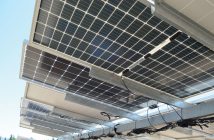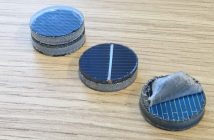- A pilot project is under way in the Netherlands which will use hydrogen to heat homes.
- An Exchange Membrane (AEM) Electrolyser is used to produce high-purity hydrogen gas from water and green electricity.
- In this project it will serve as an alternative to heating the built environment.
- Hydrogen can be produced on site from renewable energy sources and fed into the existing gas grid infrastructure.
Global Engineering Consultancy DNV GL is running a pilot project whereby homes in the suburb of in Rozenburg, Netherlands will be heated with high efficiency boilers on pure hydrogen. The project includes the municipality of Rotterdam and grid operator Stedin plus hydrogen technology company Enapter.
Exchange Membrane (AEM) Electrolyser is used to produce high-purity hydrogen gas from water and green electricity. In this project, the hydrogen gas will be supplied through a pipeline to the boiler room of a nearby apartment and provide heat to its residents.
Eight units of the electrolyser will produce a total of 4 Nm3 of hydrogen gas per hour. The EL 2.0 is extremely flexible and modular by nature. Rack-mountable in standard 19” cabinets, it can easily be stacked to form larger electrolyser systems. It is compact and simple to set up and operate using Enapter’s Energy Management System (EMS). The EMS provides insights on the hydrogen production and system performance, allowing remote monitoring and control.
“Enapter is still at an extremely early stage” says Enapter Chairman Sebastian-Justus Schmidt. “DNV GL is very experienced and a powerhouse in the sustainability field. It makes us extremely proud to supply a demonstration project with this visibility and impact.”
Hydrogen is a multi-talent that can serve many purposes. In this project it will serve as an alternative to heating the built environment. Harm Vlap of DNV GL is convinced that replacing the consumption of natural gas with viable green alternatives will gain momentum in the coming years and can be scaled: “Hydrogen can be produced on site from renewable energy sources and fed into the existing gas grid infrastructure. This will be a very viable option to substitute fossil fuels.”
Author: Bryan Groenendaal
Source: FuelCellsWorks











